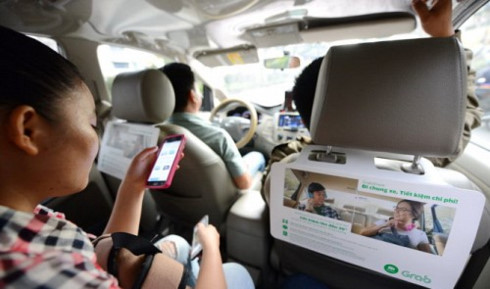Vietnam says no to fare-splitting on Grab, Uber
 |
The ruling was made nearly two months after Grab Vietnam introduced its GrabShare service to local users in early May, while Uber Vietnam announced intentions to launch a similar service, UberPool, in the Southeast Asian country.
GrabShare and UberPool both allow one passenger to share their ride and split the cost with another rider headed in the same direction.
Grab launched GrabShare in Vietnam on May 9, claiming that the feature can help passengers save up to 30 percent on their ride.
When Tuoi Tre News checked the Grab app on June 29, the feature was still available in the “ride type” options.
In a dispatch sent to Grab Vietnam and Uber Vietnam, the transport ministry said the fare-splitting option is a violation of current legal regulations.
In Vietnam, Uber and Grab are classified as companies that provide passenger transportation services via electronic contracts.
Users and drivers agree upon their trip and fare via the ‘contract’ made on the smartphone app, rather than through written contracts as with typical passenger transportation services.
According to the transport ministry, the law stipulates that cars operating in this business model are only permitted to sign one contract per trip.
If a GrabCar driver carries two passengers that agree to share their ride with each other, it means he is fulfilling two separate contracts, thus breaching regulations, the ministry explained.
On Wednesday, Tran Bao Ngoc, head of the transport ministry’s transportation division, confirmed to Tuoi Tre (Youth) newspaper that the ban on ride-sharing services followed complaints from Ho Chi Minh City’s transport department and taxi association.
“The ministry understands that the fare-splitting feature allows people to travel at lower costs and reduces the number of cars on the streets,” Bao said.
“However, the service is not in line with the current regulations so the apps must follow the rule.”
Bao also said without elaboration that disallowing the ride-sharing feature can “reduce risks for passengers when sharing rides.”
The GrabShare feature has been embraced by riders and transport experts as a way to mitigate traffic congestion in Ho Chi Minh City, allowing up to three people traveling in the same direction to share one GrabCar, rather than each hailing their own.
On the other hand, many worry that sharing a ride with a stranger is not a familiar concept to Vietnamese, while others fear that the fare-splitting feature could turn a GrabCar into a bus.
What the stars mean:
★ Poor ★ ★ Promising ★★★ Good ★★★★ Very good ★★★★★ Exceptional
Themes: Ride-hailing services
Latest News
More News
- Tien Phong strives for a greener plastics industry (December 02, 2025 | 09:22)
- Czech enterprises strengthen presence (December 01, 2025 | 18:00)
- New phase launched to support women-led ventures (December 01, 2025 | 15:08)
- Airlines race to patch Airbus A320/A321 fleets (December 01, 2025 | 09:17)
- European expertise to boost Vietnam’s sustainable logistics push (November 29, 2025 | 10:00)
- AkzoNobel: from painting walls to painting the future (November 28, 2025 | 13:31)
- Tien Phong Plastic ready for a new growth cycle (November 28, 2025 | 10:56)
- AEON Vietnam charts ambitious growth path (November 28, 2025 | 10:53)
- Carlsberg Vietnam accelerates drive towards net-zero emissions (November 27, 2025 | 19:06)
- Green manufacturing insights and transformations: SABECO’s path to industry leadership (November 27, 2025 | 14:35)

















 Mobile Version
Mobile Version